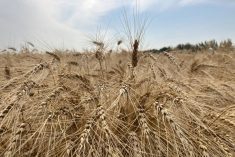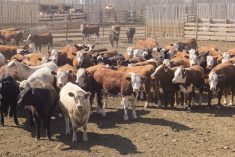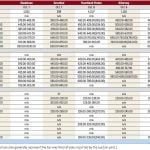A rise in pork prices due mainly to porcine epidemic diarrhea’s effects on the U.S. hog herd has bit deeper into Maple Leaf Foods’ bottom line for its first quarter ending March 31.
“Pork markets have been impacted in an unprecedented way due to a virus in the U.S. hog industry, which has renewed pressure from a sharp rise in raw material costs,” company CEO Michael McCain said Thursday without naming PEDv.
Maple Leaf, he said, has “accelerated price increases in the second quarter to recover margins.”
Read Also

U.S. livestock: Feeder cattle hit contract highs on tight supply
Chicago | Reuters – All Chicago Mercantile Exchange feeder cattle futures and most live cattle futures hit contract highs on…
Said margins in Toronto-based Maple Leaf’s prepared meats business were “compressed” in its Q1 by “sharply higher raw material and inflationary costs that were not fully offset by pricing,” the company said.
Pork input prices have risen this year on what Maple Leaf termed “outbreaks of disease” in hog production herds in the U.S., which in turn has “significantly increased the price of live hogs in response to a decline in hog supply.”
Estimates of the PED virus’ impact on U.S. hog production since the virus’ arrival in the U.S. last spring have recently run as high as seven million hogs, or up to 10 per cent of the U.S. hog herd.
The virus, while typically fatal in infected nursing-age piglets, poses no known risks to food safety, nor to the health of people or other animals.
PEDv, from last spring up to last Saturday, has been confirmed in hogs on over 6,200 U.S. farms across 30 states. The virus has also been confirmed in hogs on 61 farms since January in Canada, mainly in southwestern Ontario; its most recent confirmation came Wednesday on a farrow-to-finish operation in Middlesex County.
A weakening Canadian dollar has also contributed to higher input costs, Maple Leaf said Thursday.
The company expects the effects of PEDv to be “transitory,” McCain said, “as the industry is forecasting a return to more normal conditions later in 2014.”
“Transitional costs”
Maple Leaf on Thursday booked a Q1 net loss (attributable to common shareholders) of $132.91 million on $711.35 million in sales, down from a loss of $14.94 million on $689.35 million in sales in the year-earlier period.
The company this year is in the final phase of a processing-plant consolidation which will see five prepared-meats plants shut their doors during 2014. A Maple Leaf wiener processing plant at Hamilton closed as its lease expired in April and its production shifted to a new facility in the same city. [Related story]
However, the plant closures and shifts in production this year will come with marked increases in “transitional costs,” the company said, as start-up activities ramp up and “duplicative overhead costs” have been added to its manufacturing network, including commissioning activities at new plants in Hamilton and Saskatoon.
Such transitional costs in Q1 reached $23 million, up from $8 million in the year-earlier period.
Maple Leaf’s latest Q1 also saw the company reach a deal to sell its 90 per cent stake in baked-goods firm Canada Bread to Mexican bakery giant Grupo Bimbo, for expected net proceeds of about $1.65 billion. [Related story]
The Canada Bread deal last month received needed approvals from Canada’s Competition Bureau and from the U.S. Department of Justice under that country’s Antitrust Improvements (Hart-Scott-Rodino) Act. It still awaits Canadian government approval under the Investment Canada Act. Maple Leaf said Thursday it expects to seal its deal with Bimbo in this year’s Q2. — AGCanada.com Network
















